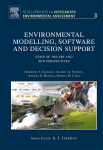Integrated Modelling Frameworks for Environmental Assessment and Decision Support
Abstract
In this chapter we investigate the motivation behind the development of modelling frameworks that explicitly target the environmental domain. Despite many commercial and industrial-strength frameworks are available, we claim that there is a definite niche for environmental-specific frameworks. We first introduce a general definition of what is an environmental integrated modelling framework, leading to the outlining of the requirements for a generic software architecture for such frameworks, which identifies the need for a knowledge layer, to support the modelling layer and the experimentation layer, to support the execution of models. The chapter then focuses on the themes of knowledge representation, model management and model execution. We advocate that appropriate knowledge representation and management tools can facilitate model integration and linking. We stress that a model development process adhering to industry standards and good practices, called ``model engineering’’ is to be pursued. Finally, we focus on the requirements of the experimental frame, which can ensure the transparency and traceability of the execution of simulation scenarios and optimisation problems in complex integrated assessment studies.
Download full text in pdf format
 Published as:
Published as:
A. E. Rizzoli,
G. Leavesley,
R. Argent,
J. Ascough,
I. N. Athanasiadis,
V. Brilhante,
F. H. Claeys,
O. David,
M. Donatelli,
P. Gijsbers,
D. Havlik,
A. Kassahun,
P. Krause,
N. W. Quinn,
H. Scholten,
R. S. Sodja,
F. Villa,
Integrated Modelling Frameworks for Environmental Assessment and Decision Support,
Environmental Modelling, Software and Decision Support, Developments in Integrated Environmental Assessment, vol. 3, pg. 101-118,
2008, Elsevier, doi:10.1016/S1574-101X(08)00607-8.
You might also enjoy (View all publications)
- CY-Bench: A comprehensive benchmark dataset for sub-national crop yield forecasting
- Hybrid phenology modeling for predicting temperature effects on tree dormancy
- To measure or not: A cost-sensitive, selective measuring environment for agricultural management decisions with reinforcement learning
